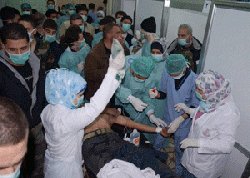A day after an alleged chemical weapon attack in Syria Tuesday, international actors weighed in on the event, as the Syrian government and insurgents exchanged accusations over who was responsible for the death of at least 25 people as a result of the toxic chemicals.
Syrian state media reported Tuesday that “terrorists fired rockets containing chemical materials on Khan al-Assal in Aleppo province,” with Information Minister Omran al-Zohbi calling the attack a “dangerous escalation.” Syrian state sources routinely refer to the rebels as “terrorists.”
Deputy Foreign Minister Faisal Muqdad said 31 people had been killed, and state media added that around 100 more were injured.
Syrian state television showed ambulances arriving at a hospital in Aleppo carrying the wounded, with medical officials and residents saying the attack involved “toxic gas.”
The insurgents denied the charges and accused government forces of a deadly long-range missile attack that caused “breathing problems.”
“We have neither long-range missiles nor chemical weapons. And if we did, we wouldn’t use them against a rebel target,” Louay Meqdad, a spokesperson for a rebel group, said.
The Doha-based Syrian National Coalition blamed the Syrian army for the attack and called for an international investigation.
Syrian Information Minister Omran al-Zoabi said that Turkey and Qatar, which have supported rebels fighting President Bashar al-Assad, bore “legal, moral and political responsibility” for the attack, a charge Turkish Prime Minister Tayyip Erdogan denied Tuesday.
International reactions fell along political alliances, as supporters and opponents of Assad hurried to confirm or deny information about the attack.

|
| A man, wounded in what the government said was a chemical weapons attack, is treated at a hospital in the Syrian city of Aleppo March 19, 2013. Syria’s government and rebels accused each other of firing a rocket loaded with chemical agents outside the northern city of Aleppo on Tuesday, an attack which a cabinet minister said killed 16 people and wounded 86. REUTERS/George Ourfalian |
The Russian foreign ministry said it had “information” from Damascus that insurgents used chemical weapons, and expressed concern that such weapons falling into the hands of rebels would “complicate further the situation in Syria.”
Iran on Wednesday accused “armed opposition groups” in Syria of having used chemical weapons on the city of Aleppo, warning against a recurrence of such attacks, the official IRNA news agency reported.
“The Islamic republic of Iran strongly condemns the inhumane act by armed opposition groups in using chemical weapons in the city of Aleppo,” foreign ministry spokesman Ramin Mehmanparast said.
The Obama administration rejected a claim by Assad’s government that the US-backed rebels used chemical weapons on Tuesday, calling it an attempt to distract from its own actions.
“We have no reason to believe that these allegations represent anything more than the regime’s continued attempts to discredit the legitimate opposition and distract from its own atrocities committed against the Syrian people,” State Department spokeswoman Victoria Nuland told reporters.
In Washington, White House spokesman Jay Carney said the US has “no evidence to substantiate the charge that the opposition has used chemical weapons.”
President Barack Obama has declared the use, deployment or transfer of chemical weapons would be a “red line” for possible military intervention by the US in the Syrian conflict.
Yuval Steinitz, Israel’s minister of intelligence and strategic affairs, also chimed in, saying Wednesday that it is “apparently clear” that chemical weapons were recently used in Syria, and that the alleged attack will be a main topic of conversation during Obama’s ongoing visit to Israel.
Steinitz, who was speaking to Army Radio, did not say how he came to the conclusion that the weapons were used. He would not comment on whether it was Assad forces or the rebels that used them, saying it was not important.
NATO supreme commander Admiral James Stavridis, decrying the deteriorating situation, said in Washington Tuesday that NATO members are mulling plans for possible military action in Syria.
However he stressed that any intervention would only occur with a UN Security Council resolution and agreement from the alliance’s 28 members.
While United Nations spokesman Martin Nesirky said the UN was ” not in a position to confirm” that chemical weapons had been used in Syria, UN Secretary General Ban Ki-moon “remains convinced that the use of chemical weapons by any party (in Syria) under any circumstances would constitute an outrageous crime,” the UN said.
The World Health Organization (WHO) said on Tuesday that it would send medical supplies to the Syrian city of Aleppo on Wednesday, but could not verify if chemical weapons or some other toxin had been used there.
“At this stage we cannot confirm the use of chemical weapons, nor what agent, if any, was used,” WHO spokesman Tarik Jasarevic told Reuters in Geneva.
According to UN estimates, some 70,000 people have been killed in over two years of conflict in Syria, with millions displaced by the fighting.
— Al-Akhbar, AFP, AP, Reuters






Leave a Reply